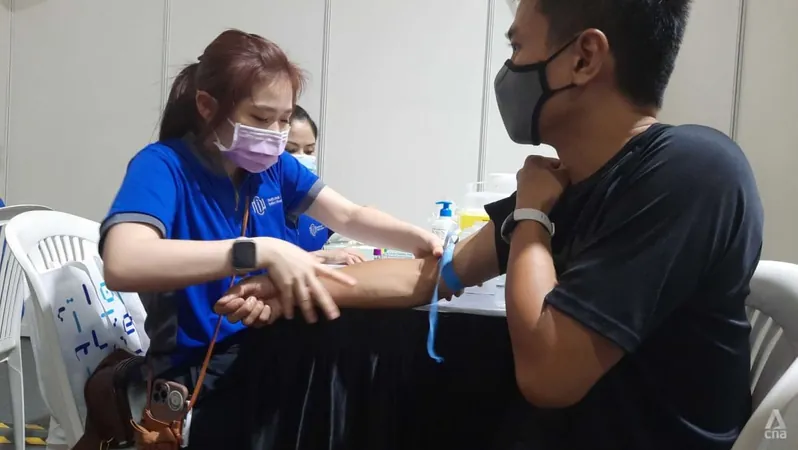
How the COVID-19 Pandemic Revolutionized Singapore’s Approach to Future Health Crises
2024-12-17
Author: Wei Ling
SINGAPORE: As life returns to its previous vibrancy, with bustling gatherings and a resurgence in air travel, the aftereffects of the COVID-19 pandemic continue to shape the nation’s public health strategies.
During the height of the crisis in 2020, Singaporean streets were eerily silent, an image starkly contrasted against today’s lively urban environment. However, the hard-earned lessons from those challenging times have ingrained themselves in Singapore's approach to managing subsequent health challenges, including recent outbreaks of tuberculosis and mpox.
Professor Vernon Lee, director at the Ministry of Health's (MOH) Communicable Disease Group, emphasized that the country has assimilated critical insights from its COVID-19 response. "Our experience demonstrated the necessity for a comprehensive approach involving various governmental and societal sectors," he stated. "Moreover, we recognized the importance of leveraging new technologies and maintaining adaptability based on changing situations."
Reflecting on previous crises, Prof Lee noted profound differences between COVID-19 and other coronaviruses like SARS, particularly in transmission patterns and public health responses. He cautioned that future pandemics, unpredictable in nature, could emerge in various forms, underscoring the need for readiness across multiple fronts.
A Collaborative Approach to Outbreak Management
When several tuberculosis cases surfaced in Jalan Bukit Merah, the MOH swiftly coordinated a multi-faceted response involving community leaders, grassroots organizations, and various sectors to reach resident populations effectively. This engagement proved invaluable in understanding and addressing the community's specific issues.
In January, a proactive screening initiative saw nearly 2,600 residents undergo mandatory tests in an outdoor carpark. While the majority tested negative, 322 were identified with latent tuberculosis infections, highlighting the critical importance of early detection and intervention in controlling spread.
Leveraging Technology and Communication
The government’s response also hinged on technology developed during the pandemic. Registration platforms streamlined the process of delivering test results and notifications, making operations more efficient for residents. Prof Lee noted, "Efficient communication is paramount. Our experiences during the COVID-19 pandemic taught us the importance of promptly conveying accurate information and countering misinformation that can easily take root."
This commitment to clear communication extended to home visits, where officials aired vital information on tuberculosis prevention and care, ensuring even those hard to reach were informed.
Preparing for Emerging Health Threats
Parallel to these efforts, Singapore's health authorities have maintained vigilance against other infectious diseases. Following the World Health Organization's declaration of mpox as a global public health emergency, the country swiftly implemented response mechanisms inspired by past lessons. Notably, a concerning new variant of mpox, clade 1b, has gained attention in various countries. While Singapore recorded 17 confirmed cases this year, all attributed to the milder clade 2 strain, the government remains proactive in refining its outbreak response protocols.
Prof Lee noted that previous experiences, particularly during COVID-19, underscored the importance of a fortified healthcare infrastructure, explicitly designed to rapidly isolate and treat patients as necessary.
Investing in Healthcare Personnel
A significant takeaway from the pandemic has been the focus on strengthening the capabilities of healthcare professionals. Associate Professor Lim Poh Lian, director of the National Centre for Infectious Diseases' High-Level Isolation Unit, emphasized the essence of continuous training in infection control practices. "Our aim is to ensure excellence in our response capabilities at all times, not just when an outbreak looms," she asserted.
Overall, as Singapore embodies resilience in the face of potential health challenges ahead, the harmonization of technology, community engagement, workforce readiness, and efficient communication will continue to guide its strategies. The spirit of camaraderie fostered during the COVID-19 years equips the nation with a robust foundation to tackle future health crises, ensuring that its citizens remain safe and informed.


 Brasil (PT)
Brasil (PT)
 Canada (EN)
Canada (EN)
 Chile (ES)
Chile (ES)
 España (ES)
España (ES)
 France (FR)
France (FR)
 Hong Kong (EN)
Hong Kong (EN)
 Italia (IT)
Italia (IT)
 日本 (JA)
日本 (JA)
 Magyarország (HU)
Magyarország (HU)
 Norge (NO)
Norge (NO)
 Polska (PL)
Polska (PL)
 Schweiz (DE)
Schweiz (DE)
 Singapore (EN)
Singapore (EN)
 Sverige (SV)
Sverige (SV)
 Suomi (FI)
Suomi (FI)
 Türkiye (TR)
Türkiye (TR)